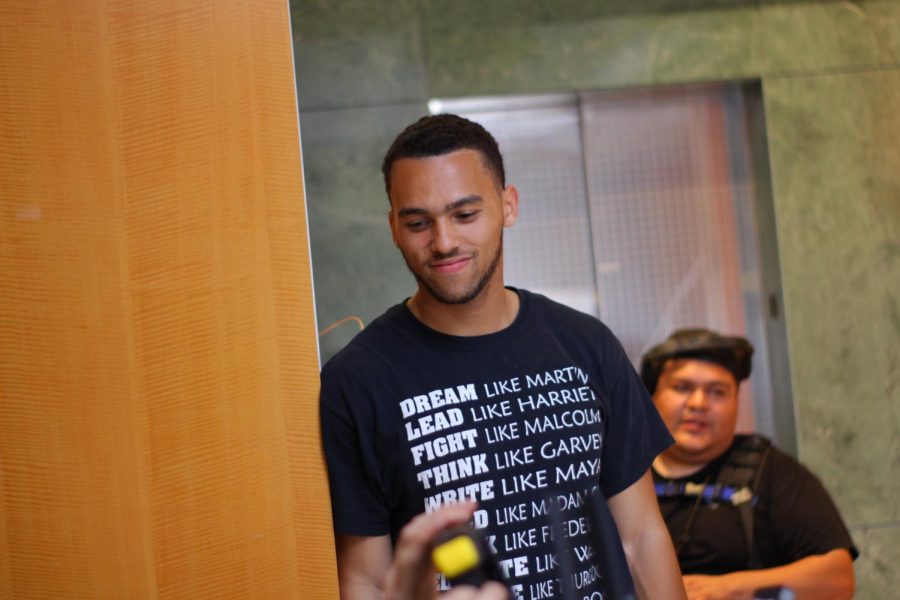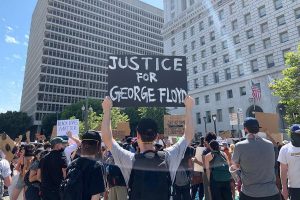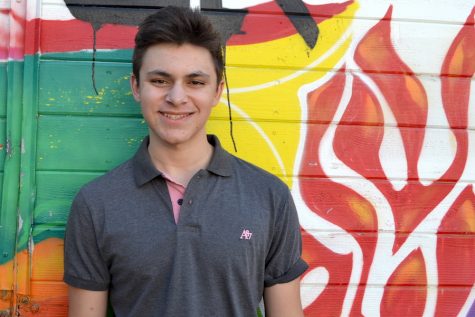‘Constantly aware’ — Shalhevet’s Fred Leach describes being black in LA
Ed Support teacher says in wake of George Floyd reaction, ‘everything is heightened’
UNEXPECTED: Shalhevet’s Digital Firehawks Instructor Fred Leach said that he was surprise to see the amount and diversity of support for justice for George Floyd and others. “It’s been encouraging to see people in Los Angeles unite to fight against injustice,” he said.
July 14, 2020
Mr. Fred Leach, whose title at school is Digital Firehawks Instructor, is part of Shalhevet’s Educational Support team. He oversees and helps students who take online classes or who use other academic accommodations.
Along with his fellow Ed. Support teacher Valencia Wilson, custodian Mary Hawkins, and new alumnus Jacob Benezra ‘20, Mr. Leach is also one of four African-Americans at Shalhevet.
In light of the death of George Floyd and the national reaction that ensued, the Boiling Point reached out to get his perspective on these developments.
Mr. Leach offered to reply to questions in writing. Below are all of his answers, sent to the Boiling Point on June 14.
Sheyna Schusterman ‘20 said that for her, Mr. Leach has been a “mentor, advisor, friend and teacher outside of the classroom.”
“He always empowers the students who feel anxious before taking a test, and he’s able to put them in a confident mindset,” Sheyna said via text message. “He’s also great at giving advice and empowering students in the halls and giving them the support they need.”
The Boiling Point: What is your family situation and-or who do you live with?
Mr. Fred Leach: I live with a roommate in an apartment in Southbay. Most of my family lives in Tallahassee, FL — though my little brother lives in Solvang, California with his wife (and new baby!!), and my sister lives in Colorado.
BP: What neighborhood of Los Angeles do you live in?
Mr. Leach: Lawndale (Southbay), near Hermosa/Hawthorne
BP: How does it feel being an African-American man in Los Angeles now, compared to a month ago?
Mr. Leach: Everything feels heightened. I am always aware of my appearance and how that affects the way people perceive me, but now it seems to be on the forefront of my mind every day. I find myself trying to be as non-threatening as possible.
BP: If different now, how was it a month ago?
FL: A month ago it was not quite as bad. Though wearing a mask to protect against COVID did create a little tension — there were many stories of people of color being harassed or persecuted by police because of their appearance in the masks.
BP: How did you feel when you heard about and saw the video of the killing of George Floyd?
Mr. Leach: I didn’t watch the video (couldn’t bring myself to), but it is sad to say I initially felt numb to it. It feels like some new injustice is happening everyday, and nothing ever gets done. Up until the protests started, I was growing tired of seeing the same hopeless cycle play out over and over (black person killed — cop put on leave — no justice).
BP: Do you know anyone personally who has been killed or injured by law enforcement in Los Angeles, or elsewhere?
Mr. Leach: I do not personally know anyone who has been seriously hurt or killed by LAPD, but I do know many people who have had racially motivated incidents with the police. Also, I spent most of my life in Dallas where someone from the community I taught in was killed by the police. His name was Jordan Edwards, and though I didn’t know him personally, he was friends with many students I taught at Balch Springs Middle School.
Here is some info about Jordan Edward’s story: https://www.cnn.com/2018/08/29/us/texas-jordan-edwards-death-sentencing-phase/index.html
BP: What has been your overall experience with the police?
Mr. Leach: My experiences have been very mixed. Growing up I never really had issues with police, but as an adult, I have had several run-ins that felt discriminatory.
-There have been times where I’ve been pulled over and questioned, then let go with no ticket or explanation for why I was pulled over.
-When I lived with my parents in my early 20s, I was once pulled over and asked why I was in that neighborhood, questioned about whose car I was in (my own) and what I did for a living.
-My worst run-in was last year, when I was pulled over for making a right on red without stopping, and was pulled out of the car, and put in the back of their police car while they searched my vehicle. After about 30 minutes in the back of the police car, I was let go with a warning and a fix-it ticket to update my registration.
BP: Have you been involved in any protests since the killing of George Floyd? If so, what has it been like to be there?
Mr. Leach: I marched in the pride/BLM parade today in Hollywood/West Hollywood. Now that I’m back in town I’m eager to be involved with as many protests as I can. I have also donated some money to Black Lives Matter, and some of the different bail funds.
BP: Is fear of police a part of your life that affects your life or your thinking in a day-to-day way? If so, why?
Mr. Leach: Definitely.
As a black man I am constantly aware of where I am and the chances that the police could be called. For example, the last 2 weeks I was in Solvang (small Dutch town North of Santa Barbara) with my brother. There are very few people of color there, and when I went on walks or went into town, I would always just mentally prepare myself to be questioned or stopped.
BP: How big a problem do you think police misbehavior or mistreatment of African-Americans is in Los Angeles?
Mr. Leach: Very big.
I am not an expert on LA (I’ve only been here 5 years) but even still, the history of LA policing is very troubled. When you go to communities that are predominantly African American or Hispanic, you see it. The issues are systemic, and while the cops are a part of that problem, it goes even deeper.
You can sense the tension. Where I live in Lawndale, the cops are constantly patrolling and it’s clear there’s large disconnect between them and our community.
BP: Have you lived in other cities that you might compare Los Angeles to in this regard?
Mr. Leach: Dallas.
Teaching definitely opens your eyes to the way people of color are perceived. I once witnessed kids be chased away after a school dance by cops using airsoft guns and mace.
Another time, a kid that I coached was arrested in class and then paraded through the hallways as if to set an example.
Even deeper than police issues, when you look at the achievement gap in education, the school-to-prison pipeline, and lack of resources for a lot of predominantly Black/Hispanic communities, it’s clear that solving the brutality issue is just a small drop in the pot of systemic racism.
Law enforcement likes to blame their rough treatment on the large amounts of crime and corruption in low income areas. How can we expect anything less when the institution is not designed for people in these areas to succeed?
BP: Are you located near any violence or looting that has gone on within the past two weeks?
Mr. Leach: My girlfriend lives down the street from the Grove but we haven’t felt any danger or had any issues. Businesses have boarded up their windows to protect, but I have seen very little damage actually done.
BP: If so, what was your reaction when you heard about it or saw it?
Mr. Leach: Honestly, I think it’s all the natural progression of protest. Our community has been protesting peacefully and calling for justice for decades. Nothing gets done! People will eventually decide that peaceful protest is not enough.
While looting obviously isn’t the ideal method, money talks in America, so destroying property and causing chaos is a method of getting the powers at be to listen. Dave Chapelle recently released a mini-special on Youtube called “8:46”, where he breaks it down a lot better than I do.
Our country was founded on destruction of property: The Boston Tea Party is viewed as a shrewd statement made by the colonists to protest taxation without representation. When black people do it, it becomes irresponsible.
BP: Have you been surprised by the local or national reaction to the killing of George Floyd, and if so in what way, and if not why not?
Mr. Leach: I have been surprised to see how many diverse groups of people have been involved in protesting and calling for justice for George Floyd, Breonna Taylor and the countless others. It’s been encouraging to see people in Los Angeles unite to fight against injustice.
I have also been surprised by the steps being taken by some businesses and groups. The amount of money being donated to BLM and other justice causes is encouraging. That being said, we still have such a long way to go, and I really hope it doesn’t fade away like it has in the past.
BP: How do you think your experience as a teacher at Shalhevet is different from that of your non-black colleagues?
Mr. Leach: I won’t say my experience is so vastly different on a daily basis, but I am always aware of my blackness. Not really because anyone has done anything, but because I try to ensure that how I speak, work and behave is a positive representation of black people.
The issue with racism or any form of bigotry is that most times you feel it indirectly and you never know when it will come, so you’re always just a little on edge.
Along with that, I am also concerned about making people feel comfortable and ensuring that they can be open and honest with me. I think we live in a world where people are so scared to offend and that can cause awkwardness too.
So far, Shalhevet has been a very welcoming place for me and I’ve really enjoyed my time. It’s also nice to have people like Mr. Weslow and Dr. Evins who I trust, and feel I could always come to if I felt like there was an issue.
BP: How do you view your Shalhevet community vis-a-vis race, awareness, the situation of people of color in the U.S. or L.A.?
Mr. Leach: To be honest, I’m not sure. There are definitely a lot of people at the school who are well informed and who I view as allies — Dr. Evins, Eli, Esther, Aviva — Those are just the people that I have had the chance of speaking with personally, so I’m sure there are more.
BP: What would you like to convey to your students, colleagues, and/or friends that you think they don’t know?
Mr. Leach: Two things:
1) ‘Black Lives Matter’ and Black people in general are not against white people or police! We are not for violence — We are against racism and police brutality. There are a lot of good cops and people of all races that we love, but we’re at the point where if you don’t support us, you’re against us, and that means you’re part of the problem!
2) The black experience is so diverse! I grew up in a mostly White suburb and have friends who have grown up all over: The hood, the suburbs, overseas, etc. I have black friends that are doctors, artists, educators, politicians, business owners, you name it— But just because we aren’t the “traditionally” oppressed stereotype of black doesn’t mean we can’t be/haven’t been affected by racism.
Part of the black experience is that no matter what we do, whether we are poor or rich, there are systemic barriers that we have to overcome. They may affect us differently (large/small/life-threatening/trivial), but it’s always there.
BP: Is there anything else you’d like to tell us?
Mr. Leach: Please continue to cover the protests and be purposeful with the language you use to describe them. You have such a prestigious platform and with that comes a lot of power.
We are not a dangerous people, but I have noticed some news outlets using language that has violent connotations. That’s the type of stuff that is systemic and may not even be a conscious decision. That is why it is so important to be purposeful. To defeat systemic issues we need allies who are more than just “not racist”! We have to actively fight to dismantle the system that is built to oppress people of color.















